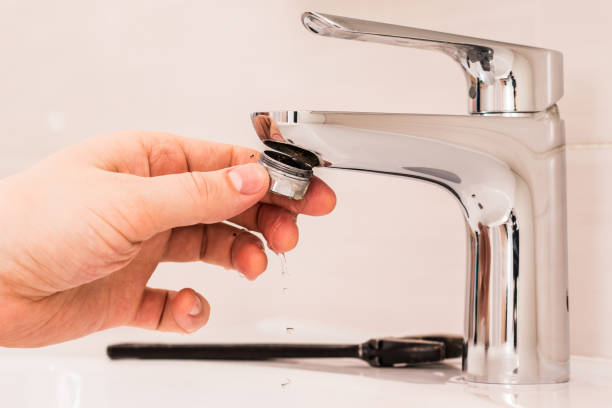The Explanations Behind Fixing a Malfunctioning Faucet
The Explanations Behind Fixing a Malfunctioning Faucet
Blog Article
Have you been searching for details around Why It's Important to Fix Leaky Faucets?

Leaking faucets may appear like a small inconvenience, however their influence goes beyond simply the nuisance of the sound. From drainage to incurring unneeded economic expenses and wellness risks, neglecting a trickling faucet can cause numerous effects. In this short article, we'll explore why it's essential to resolve this usual household problem without delay and effectively.
Waste of Water
Environmental Influence
Leaking taps contribute dramatically to water wastage. According to the Epa (EPA), a solitary tap dripping at one drip per second can throw away more than 3,000 gallons of water per year. This not only pressures water resources however likewise influences ecosystems and wildlife depending on them.
Step-by-Step Overview to Fixing a Dripping Faucet
Tools Called for
Before trying to fix a dripping faucet, gather the required tools, including a flexible wrench, screwdrivers, replacement parts (such as washers or cartridges), and plumber's tape.
Usual Tap Issues and Their Solutions
Determine the sort of faucet and the details issue creating the drip. Usual problems consist of damaged washers, rusty valve seats, or faulty O-rings. Refer to maker directions or on the internet tutorials for detailed assistance on fixings.
Financial Costs
Raised Water Expenses
Past the ecological effect, leaking taps can pump up water expenses considerably. The gathered wastefulness gradually converts right into greater energy expenditures, which could have been stayed clear of with timely repair services.
Potential Property Damage
In addition, prolonged dripping can cause harm to components and surface areas bordering the faucet. Water build-up can trigger discoloration, deterioration, and also architectural concerns if left unattended, resulting in added repair service expenses.
Wellness Issues
Mold and Mildew Growth
The constant presence of dampness from a trickling tap produces a suitable setting for mold and mildew and mold growth. These fungi not only jeopardize interior air high quality however also position health threats, specifically for individuals with respiratory system conditions or allergic reactions.
Waterborne Conditions
Stationary water in dripping faucets can become a breeding place for microorganisms and various other microorganisms, enhancing the risk of waterborne illness. Impurities such as Legionella germs grow in stagnant water, possibly resulting in serious health problems when ingested or breathed in.
Do it yourself vs. Expert Fixing
Benefits and drawbacks of DIY Repair Service
While some might try to repair a trickling tap themselves, DIY repair work feature their very own set of challenges. Without appropriate expertise and devices, DIY attempts can worsen the concern or bring about incomplete repair services, lengthening the trouble.
Benefits of Working With a Professional Plumber
Working with a specialist plumber guarantees that the underlying reason for the dripping faucet is attended to successfully. Plumbing professionals have the know-how and equipment to diagnose and repair faucet issues successfully, conserving time and lessening the danger of additional damage.
Environmental Responsibility
Individual Contribution to Preservation
Taking obligation for repairing trickling taps straightens with broader efforts toward water preservation and ecological sustainability. Every individual's actions jointly make a significant impact on maintaining valuable resources.
Sustainable Living Practices
By focusing on prompt fixings and embracing water-saving behaviors, individuals contribute to lasting living techniques that benefit both present and future generations.
Safety nets
Normal Maintenance Tips
To prevent dripping faucets, carry out routine maintenance such as cleaning up aerators, evaluating for leakages, and changing damaged parts quickly. Furthermore, take into consideration mounting water-saving tools or updating to extra efficient fixtures.
Value of Prompt Repair Works
Addressing leaking taps as quickly as they're noticed avoids additional water waste and prospective damage, eventually saving both water and cash over time.
Influence On Property Worth
Understanding of Well-Maintained Home
Preserving a home in good condition, consisting of resolving maintenance concerns like leaking taps, improves its regarded value and charm amongst potential buyers or renters.
Influence on Resale Worth
Characteristics with well-kept plumbing components, consisting of taps, command higher resale values in the real estate market. Addressing leaking faucets can contribute to a favorable impression during residential property examinations and negotiations.
Verdict
Resolving a trickling faucet goes beyond plain comfort; it's an essential action toward preserving water, decreasing economic expenses, and safeguarding health and wellness and home. Whether via DIY fixings or expert assistance, acting to deal with dripping faucets is a little yet impactful means to advertise accountable stewardship of resources and contribute to a healthier, a lot more lasting future.
How to Fix a Leaky Faucet: Step-by-Step Repair Guide
A leaky faucet may seem like a simple annoyance, but if it's not fixed promptly, that leak could cost hundreds to potentially thousands. From water damage to mold, mildew, and high water bills, even a tiny leak can be catastrophic if left unattended. Damage like this can even affect the overall value of your home, so it's important to take the right approach for leaky faucet repair. You may need the help of a plumber in some cases, but we've got a few tips you can try on how to fix a leaky faucet before calling the pros.
Four Faucet Types
When you're learning how to fix a leaky faucet, the first step is knowing what kind of faucet you're working with! There are four common types.
Cartridge Faucets
Cartridge faucets come in one- or two-handled varieties. In one-handled cartridge faucets, hot and cold water combines in a single cartridge. In the two-handled versions, hot and cold water are controlled separately and mixed in the faucet.
Ball Faucets
Ball faucets have a single lever you push up and down to adjust the pressure and rotate to change the temperature. A slotted metal ball controls the amount of water allowed into the spout.
Compression Washer Faucets
They're the oldest type of faucet, but they're still used in many homes — especially older ones. Compression faucets have two separate handles that, when turned, raise or lower the washer that seals a water valve. This valve stops water from flowing through the faucet when it is turned off.
Disc Faucets
Disc faucets rarely need to be repaired due to their maintenance-free design. The water flow is controlled by two discs — the upper one raises and lowers against a fixed lower disc, creating a watertight seal. If your disc faucet starts leaking, you may need to replace the seals or clean residue buildup from the inlets.
Fixing a Leaky Faucet
Step 1: Turn Off the Water
Whether you're learning how to fix a leaky bathtub faucet or how to fix a leaky kitchen faucet, always turn off the water supply to your working area when you're fixing a leak. The last thing you want is a flood added to your list of things to fix.
Look for the shutoff valves below your sink or around the tub and turn them clockwise to stop the water flow. If your faucet doesn't have shutoff valves, you may need to turn off the water for the whole house. Check to make sure it's off by turning the faucet on. If nothing comes out, you're ready to start the repair.
Step 2: Take Apart the Faucet
How you disassemble your faucet depends on the type of fixture you have. You can use a flathead screwdriver to remove the caps on top of the handle or handles for cartridge and compression faucets. Inside, you should see handle screws. Unscrew these with a screwdriver to remove the handle.
Disc- and ball-style faucets will typically have an inlet screw near the handle, and removing that will reveal the interior of the faucet.
Detach the Valve Stem
For cartridge- and compression-style faucets, you'll see the inner valve stem or cartridge once you remove the faucet handles. If you have a compression faucet, unscrew the brass valve stem. If you have a cartridge faucet, pull out the cartridge. If your cartridge has been in place for a while, it may require some tools or extra force to remove it due to mineral deposits.
Examine and Replace Parts
Once you've removed the parts, check them out to confirm what needs to be replaced. You may see corroded rubber washers, O-rings, stems, or cartridges. On a ball-style faucet, check the seats and springs for damage.
If you need to repair a leaky disc faucet, check the inlet and seals on the lower disc.
Once you determine what parts must be replaced, visit your local hardware store. Bring the damaged parts with you to ensure you can purchase the correct components to replace them.
Clean Valves and Faucet Cavity
If you've removed a stem or cartridge, you may notice mineral buildup in the faucet's threads. Use white vinegar to clean the valve seat by soaking it for a few minutes, then scrub it away with a soft toothbrush and rinse with warm water. You can also clean the interior of the faucet in the same way.
Reassemble the Faucet
Once your faucet is cleaned and the required parts have been replaced, it's time to reassemble it. Put the pieces back together and slowly turn the water supply back on. Doing this slowly is crucial because too much initial water pressure can damage the new hardware you've just installed.
https://homewarranty.firstam.com/blog/how-to-fix-leaky-faucet

We are very intrigued by Why It's Important to Fix Leaky Faucets and I really hope you enjoyed the new post. Enjoyed reading our content? Please quickly share it. Let somebody else locate it. Thank you for your time. Don't hesitate to check our blog back soon.
Report this page